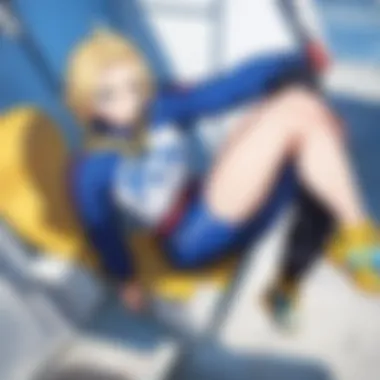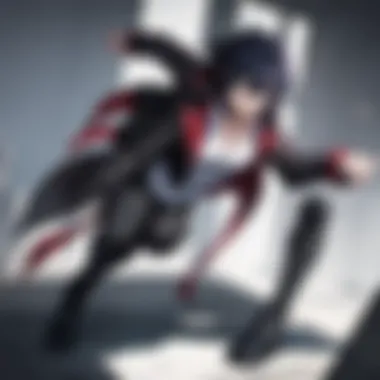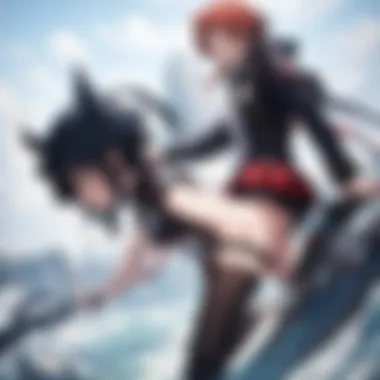Unveiling the Intricacies of the Inaugural Episode of My Hero Academia


Episode Reviews
The first episode of My Hero Academia introduces viewers to the world of heroes and villains, setting the stage for an enthralling narrative. In this debut installment, we witness the protagonist's journey as he navigates the challenges of acquiring a quirk and striving to become a great hero. The episode's pacing is dynamic, keeping the audience engaged with a blend of action sequences and character developments.
Summary of the Episode
The episode kicks off by unveiling the protagonist, Izuku Midoriya, a quirkless boy in a society where superpowers, or 'quirks,' are the norm. Despite facing ridicule and discrimination, Izuku's unwavering determination to enroll in U.A. High School, a prestigious hero academy, drives the narrative forward. His encounter with his idol, All Might, marks a turning point in his life, offering him a chance to inherit the legendary hero's quirk, 'One For All.' Throughout the episode, themes of heroism, sacrifice, and perseverance resonate, laying a strong foundation for the series.
Analysis of Key Events
Key events in the episode include Izuku's fateful meeting with All Might, where the protagonist proves his heroic qualities despite lacking a quirk. All Might's decision to pass on his quirk to Izuku sets the stage for transformative character growth and challenges ahead. Additionally, the introduction of Katsuki Bakugo, Izuku's childhood friend turned rival, adds depth to the character dynamics and foreshadows conflict to come.
Discussion on Character Development
The first episode lays the groundwork for significant character developments, particularly focusing on Izuku's growth from a quirkless dreamer to a budding hero. His determination, compassion, and sense of justice shine through, hinting at the narrative trajectory of his evolution. All Might's role as a mentor figure propels Izuku towards self-discovery and defining his path as a hero-in-training, setting the tone for mentorship themes throughout the series.
Highlight Memorable Moments
Memorable moments from the first episode include Izuku's heroic stand against a sludge villain to save Katsuki, showcasing his bravery and moral compass despite the odds stacked against him. All Might's grand entrance and inspiring words resonate as a beacon of hope and symbol of heroism. These moments not only captivate viewers but also foreshadow the epic battles and moral dilemmas that will shape the characters' destinies.
Introduction to My Hero Academia
Delving into the inaugural episode of My Hero Academia is a journey into a world where heroes and villains collide with remarkable force. This article dissects the debut of this popular anime series, unraveling its core elements, characters dynamics, and thematic depth. By analyzing the protagonist's introduction and the narrative groundwork laid in the first episode, viewers gain insights into the epic saga that unfolds within the My Hero Academia universe.
Overview of the Series
Background of the Anime
Diving into the genesis of My Hero Academia reveals a tapestry woven with intricate storytelling and rich character development. The anime's background serves as a cornerstone, providing viewers with a contextual understanding of the world they are about to explore. The meticulous attention to detail in establishing the setting and societal norms offers a solid foundation for the overarching narrative. This deliberate construction not only enhances the viewer's immersion but also sets the stage for the complexity and depth of the series.
Premise of My Hero Academia
At the heart of My Hero Academia lies a captivating premise that resonates with viewers on a profound level. The concept of a society where superpowers define individuals' roles and destinies introduces a compelling dynamic that transcends typical superhero tropes. The premise's innovation lies in its exploration of themes such as legacy and societal expectations, adding layers of depth to the characters and their motivations. This foundational aspect of the series is a driving force behind the narrative's evolution, captivating audiences and keeping them invested in the heroes' plight.
Significance of the First Episode
Setting the Tone for the Series
The first episode's role in setting the tone for My Hero Academia is paramount to the series' success. Through expert storytelling and nuanced character introductions, the episode establishes the narrative's emotional and thematic landscape. By blending moments of vulnerability with acts of heroism, the tone is set for a rollercoaster of emotions that viewers will experience throughout the series. This early establishment of tone not only captivates the audience but also foreshadows the narrative depth that My Hero Academia promises to deliver.
Introduction of Main Characters
Introducing the main characters in the debut episode serves as a crucial step in engaging the audience with the series' core ensemble. Each character's introduction is meticulously crafted to convey their unique traits and motivations, setting the stage for dynamic interactions and personal growth. By spotlighting the strengths and vulnerabilities of the protagonists early on, the episode invites viewers to empathize with and invest in the characters' journeys, laying a solid foundation for the emotional arcs that will unfold.


Impact on the Audience
Initial Impressions and Reactions
The initial impressions and reactions elicited by the first episode of My Hero Academia play a pivotal role in shaping viewers' expectations and emotional investment. The episode's ability to evoke a visceral response from the audience through its character dynamics and storytelling prowess sets the stage for a thrilling and engaging viewing experience. By strategically crafting moments that resonate with viewers on a personal level, the episode creates a lasting impact that lingers far beyond its runtime, fostering a sense of connection between the audience and the characters.
Building Viewer Engagement
Building viewer engagement is a craft honed through meticulous storytelling and character development, both of which are exemplified in the first episode of My Hero Academia. By weaving a narrative tapestry that intertwines action, emotion, and intrigue, the episode captivates viewers and entices them to invest their emotions in the characters' journeys. This careful balance between expository world-building and character-driven storytelling ensures that every moment on screen contributes to a layered viewing experience, keeping the audience eagerly anticipating each new development.
Plot Analysis and Key Scenes
Protagonist's Journey Beginnings
In the initial stages of the series, meeting Izuku Midoriya serves as a pivotal moment that lays the groundwork for the protagonist's growth. This encounter showcases the inherent determination and potential within Izuku, despite his initial setbacks. By highlighting Izuku's resilience and unwavering spirit, this scene sets a tone of perseverance and self-discovery that resonates throughout the series. The exploration of Izuku's journey from a quirkless individual to a budding hero encapsulates the essence of heroism in a world filled with challenges and uncertainties.
Meeting Izuku Midoriya
The meeting of Izuku Midoriya is a crucial aspect of the protagonist's journey, emphasizing his innate courage and sense of justice. This encounter underscores Izuku's admiration for heroes and his unwavering desire to become one despite lacking superhuman abilities. By portraying Izuku's determination and humility, the scene establishes him as a relatable and aspirational character for audiences. The significance of this meeting lies in its ability to showcase the power of will and passion in overcoming obstacles, a recurring theme in My Hero Academia's narrative.
Discovery of Quirklessness
The discovery of Izuku's quirklessness unfolds as a poignant moment that challenges traditional notions of heroism. By revealing Izuku's lack of a quirk, the narrative confronts societal expectations and celebrates individual strengths beyond superpowers. This revelation not only sets Izuku apart from his peers but also highlights his exceptional courage in pursuing heroism against all odds. The exploration of quirklessness adds depth to Izuku's character, making his journey towards becoming a hero more compelling and empathetic to viewers.
Encounter with All Might
The encounter with All Might marks a turning point in Izuku's life, as the Symbol of Peace introduces him to a world of endless possibilities. All Might's larger-than-life presence and mentorship role not only inspire Izuku but also instill in him a sense of responsibility and purpose. Through this encounter, viewers witness the passing of the One for All quirk, symbolizing the transfer of dreams, hopes, and legacies from one generation to the next.
Symbol of Peace's Introduction
All Might's introduction as the Symbol of Peace encapsulates the core values of heroism and selflessness. His charismatic persona and unwavering dedication to justice make him a beacon of hope in a society plagued by uncertainty and danger. By portraying All Might as a symbol of strength and reassurance, the narrative sets the stage for Izuku's transformative journey under his guidance.
Passing of One for All Quirk
The passing of the One for All quirk from All Might to Izuku symbolizes the legacy of heroism and the inheritance of noble ideals. This pivotal moment represents a transfer of power but, more importantly, a transfer of belief in the potential of the next generation. The symbolism embedded in this act shapes Izuku's destiny and underscores the weight of responsibility that comes with possessing great power.
Class 1-A Introduction
The introduction of Class 1-A brings a diverse range of characters and personalities into Izuku's life, shaping his worldview and relationships. By meeting classmates and rivals, Izuku navigates the complexities of hero training while forging bonds that will define his growth. The emergence of friendship dynamics within the class not only adds depth to the narrative but also showcases the varied motivations and aspirations that drive each character forward.
Meeting Classmates and Rivals
Interactions with classmates and rivals offer Izuku the chance to form alliances, rivalries, and friendships that will shape his journey moving forward. These relationships highlight the diverse nature of hero society, where competition coexists with camaraderie, creating a dynamic and multifaceted environment for character development. By showcasing the different personalities within Class 1-A, the narrative adds layers of depth and complexity to the series, enriching the overall storytelling experience.
Emergence of Friendship Dynamics


The emergence of friendship dynamics among Class 1-A students deepens the emotional resonance of the narrative, underscoring the importance of mutual support and growth. As friendships evolve and bonds strengthen, viewers witness the power of unity in overcoming challenges and achieving common goals. The dynamic interplay between characters not only drives the plot forward but also highlights the individual strengths and weaknesses that make each hero-in-training unique. Through the exploration of friendship dynamics, My Hero Academia celebrates the collaborative spirit that defines true heroism.
Character Dynamics and Relationships
Exploring character dynamics and relationships in the context of the inaugural episode of My Hero Academia is pivotal to understanding the intricacies of the narrative. The interactions between characters not only drive the plot forward but also reveal underlying themes and conflicts that add depth to the story. By examining how characters such as Deku and Bakugo interact with each other, viewers gain insight into their motivations, aspirations, and emotional complexities. Analyzing these dynamics sheds light on the evolving relationships that play a significant role in shaping the trajectory of the series.
Deku and Bakugo Dynamic
Competitive Rivalry
The competitive rivalry between Deku and Bakugo is a central aspect of their relationship that fuels the character dynamics in My Hero Academia. Their intense competition stems from contrasting personalities and differing approaches to heroism. Deku's admiration for heroes and his selfless nature often clash with Bakugo's competitive drive and his more aggressive demeanor. This rivalry adds tension and conflict to their interactions, creating compelling character dynamics that drive the narrative forward.
History of Their Relationship
The history of Deku and Bakugo's relationship is complex, having roots in their childhood and shared experiences. Deku's admiration for Bakugo as a powerful hero-in-the-making contrasts with Bakugo's perception of Deku as inferior due to his lack of a quirk. This history of superiority and inferiority shapes their dynamic, leading to moments of both camaraderie and rivalry. Understanding their past interactions enriches the viewer's experience by providing context for their present relationship dynamics.
Fatherly Figure - All Might
Mentorship Role
All Might's mentorship role in Deku's life serves as a crucial element in shaping the protagonist's growth and development. His guidance, wisdom, and unwavering support not only propel Deku towards becoming a hero but also instill valuable lessons on heroism, courage, and selflessness. All Might's mentorship reflects the importance of having a positive influence in one's life, particularly in challenging times, highlighting the significance of mentorship in fostering growth and resilience.
Impact on Deku's Growth
All Might's impact on Deku's growth is profound, with the symbol of peace playing a transformative role in the protagonist's journey. Through his interactions with All Might, Deku learns valuable lessons about heroism, power, and responsibility. All Might's influence not only shapes Deku's ideals and values but also provides him with the necessary guidance and support to navigate the challenges he faces. The impact of All Might's presence on Deku underscores the themes of legacy, heroism, and self-discovery in a nuanced manner.
Influence of Classmates
Support System in Class 1-A
The support system within Class 1-A reflects the importance of camaraderie and teamwork in the world of heroes. Deku's classmates offer him not only friendship and encouragement but also unique perspectives and skills that complement his own. The solidarity within the class creates a sense of community and belonging, highlighting the value of collaboration in achieving common goals. The support system in Class 1-A underscores the theme of unity in diversity, showcasing how individuals with varying abilities can come together for a common purpose.
Formation of Heroic Bonds
The formation of heroic bonds among classmates signifies the transformative power of shared experiences and challenges. As Deku and his peers navigate the trials of hero training together, they forge strong bonds built on trust, respect, and mutual growth. These bonds transcend mere friendship, evolving into a sense of camaraderie and shared purpose that defines their hero journey. The formation of these heroic bonds illustrates the theme of unity in adversity, emphasizing how collective strength and collaboration can lead to extraordinary achievements in the face of adversity.
Themes and Symbolism
In dissecting the first episode of My Hero Academia, it becomes evident that themes and symbolism play a vital role in shaping the narrative landscape. The thematic elements in this article serve as the underpinning framework that elevates the viewer's understanding of heroism and adversity. By delving into specific elements such as the desire to become a hero, overcoming adversity, passing down quirks, responsibility of power, public perception of heroes, and the media's role, the article aims to provide a nuanced exploration of the complexities within the series. Each theme is meticulously analyzed to showcase its significance in portraying the multifaceted layers of the hero-centric narrative.
Desire to Become a Hero
The Desire to Become a Hero stands as a central theme in My Hero Academia, encapsulating the protagonist's journey towards achieving their ideals of heroism. This specific aspect not only drives the overarching plot but also embodies the core essence of the series. The author emphasizes the relentless pursuit of heroism, showcasing the character's unwavering commitment to righteousness and selflessness. By exploring the nuances of this theme, readers gain insight into the character's motivations, inner struggles, and moral dilemmas, fostering a deeper connection to the narrative.


Overcoming Adversity
The concept of Overcoming Adversity serves as a pivotal element in portraying the challenges and growth of characters in the series. This aspect highlights the resilience and tenacity required to transcend obstacles, both physical and emotional. The article delves into how characters navigate adversity, showcasing their evolution and development through overcoming various trials. By showcasing the struggles and triumphs of characters, the narrative reinforces the idea that adversity serves as a catalyst for personal growth and self-discovery.
Legacy and Inheritance
With a focus on Legacy and Inheritance, the article explores the intricate dynamics of power transfer and the weight of responsibility. By delving into topics like passing down quirks and the responsibility of power, readers gain a deeper understanding of the generational aspects of heroism within the series. The author highlights the complexities of inheritance, showcasing how characters grapple with the legacies they inherit and the moral obligations that come with wielding power.
Passing Down Quirks
The Passing Down Quirks theme delves into the transmission of unique abilities from one generation to the next, highlighting the lineage and continuity of power within the series. This aspect not only enriches the character dynamics but also underscores the significance of tradition and evolution in shaping the hero society. By exploring the intricacies of passing down quirks, the article sheds light on how these inheritances influence character trajectories, alliances, and conflicts.
Responsibility of Power
The Responsibility of Power theme delves into the ethical dilemmas and moral obligations that accompany wielding authority and abilities. This specific aspect accentuates the delicate balance between power and accountability, showcasing how characters grapple with the consequences of their actions. By dissecting the complexities of responsibility, the narrative challenges readers to contemplate the true essence of heroism and the sacrifices that come with great power.
Society's View on Heroes
In scrutinizing Society's View on Heroes, the article explores how public perception and media influences shape the portrayal of heroes within the narrative. By examining topics like public perception of heroes and the media's role, the author sheds light on the societal constructs that define heroism and villainy. The article dissects the power dynamics between heroes, villains, and the populace, emphasizing how external factors influence the hero narrative.
Public Perception of Heroes
The Public Perception of Heroes theme delves into how societal norms and expectations shape the public's perspective on hero figures. This aspect scrutinizes the idolization, scrutiny, and expectations placed on heroes by the masses, highlighting the complexities of fame and reputation. By exploring the nuances of public perception, the article provides insight into how heroes navigate public image, ethics, and the blurred lines between heroism and celebrity.
Media's Role
The Media's Role theme delves into the influence of journalism, propaganda, and storytelling in shaping hero narratives and societal viewpoints. This aspect highlights how the media serves as a double-edged sword, capable of both elevating and tarnishing a hero's reputation. By dissecting the media's impact on heroism, the article prompts readers to reflect on the role of storytelling in constructing hero mythos and shaping public opinion.
Exploring Visual and Sound Design in My Hero Academia
In delving into the realm of visual and sound design within My Hero Academia, we unearth a crucial facet that elevates the viewing experience to sublime heights. The meticulous attention to detail in the animation style and musical score reverberates throughout the series, instilling an immersive quality that captures the essence of heroism and villainy in a visually captivating manner.
Animation Style
The animation style of My Hero Academia shines through its dynamic action sequences, a pulsating heartbeat that propels the narrative forward with unrelenting energy. Each frame is meticulously crafted to convey the adrenaline-pumping thrill of hero battles, immersing viewers in a whirlwind of explosive combat and heart-stopping moments. The unique feature of these sequences lies in their seamless fluidity, seamlessly blending choreographed movements with intricate detail, offering a visual spectacle that enhances the overall storytelling.
Character Design
The character design within My Hero Academia serves as a visual testament to the diverse range of personalities that populate its vibrant world. Each character's distinct appearance not only reflects their individual quirks and abilities but also contributes to the narrative depth of the series. From the iconic visage of All Might to the intricate details of Deku's costume, the character designs are a masterclass in visual storytelling, breathing life into the heroes and villains that inhabit this dynamic universe.
Musical Score
Imbued with emotion and grandeur, the musical score of My Hero Academia amplifies the thematic resonance of each scene, orchestrating a symphony of sound that heightens the audience's emotional connection to the story. The theme songs, with their rousing melodies and evocative lyrics, serve as anthems of heroism, inspiring viewers to embark on a thrilling adventure alongside their favorite characters. Meanwhile, the emotional impact of the score resonates deeply, infusing key moments with a profound sense of resonance and pathos, underscoring the triumphs and tribulations of heroism in a way that lingers long after the credits roll.
Emotional Impact
Within the realm of voice acting in My Hero Academia, the performances of voice actors breathe life into the characters, infusing them with nuanced emotions and rich personalities. The distinctive voices of each character convey a depth of feeling that transcends the screen, forging a powerful connection with the audience. Whether capturing the fiery determination of Bakugo or the heartfelt sincerity of Deku, the voice actors' performances imbue the series with a visceral authenticity that resonates with viewers on a profound level.
Character Portrayal
The portrayal of characters in My Hero Academia is a testament to the craftsmanship of voice actors, who deftly navigate the nuances of each role with skill and precision. By infusing their performances with subtle inflections and emotional depth, the voice actors bring a sense of authenticity to their characters, drawing viewers into their world with captivating portrayals. From conveying the inner turmoil of Endeavor to the unwavering resolve of Mirio, each character is imbued with a complexity that enriches the narrative tapestry of My Hero Academia, leaving a lasting impression on all who bear witness to their heroics.







